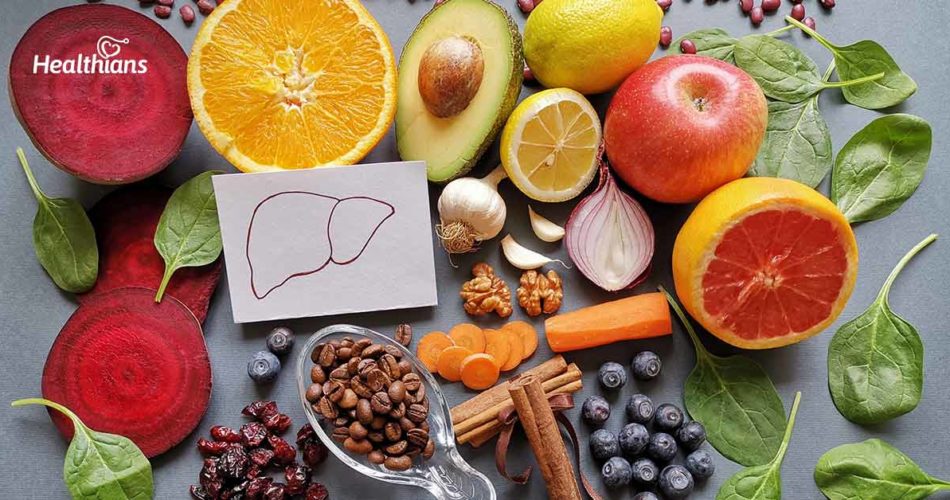Contributed by: Healthians Team
Introduction
The liver is the second largest organ in the body (skin being the first) and is located below the diaphragm in the upper right corner of the abdomen. The liver is responsible for more than 500 important functions, of which some of the most critical ones include:
- Produces a digestive fluid called bile, which is stored in the gallbladder. Bile is used by the body to transform fats in food into fatty acids, in the small intestine. It also helps in removing waste products like bilirubin (a yellowish-brown color chemical compound in RBCs) from the body through excretion.
- Produces most of the proteins found in the bloodstream, albumin being a major one. Albumin helps in regulating the levels of blood volume and distribution of fluids in the body.
- Produces specific proteins to carry fats all over the body.
- Helps in converting excess glucose into glycogen which is then stored and can be converted back to glucose for energy when required.
- Helps in cleansing the blood of toxic substances and promotes immunity to fight infections.
Habits the affect liver health
The above-mentioned functions aid in promoting overall health, but sometimes they are affected by certain habits that may give rise to symptoms of serious liver ailments. These habits include:
- Alcohol consumption
- Too much sugar intake
- Consuming food rich in saturated and trans fats (ready-to-cook foods, fried chicken, chips, cakes, cookies, etc.)
- Excessive salt intake
- Health supplements without consultation
- Lack of water intake
Early signs & symptoms of liver complications
If the above-mentioned habits are in practice for a long time, the body will start manifesting some early signs that should not be ignored as they can lead to serious liver ailments.
- Extreme tiredness
- Stomach and joint pain
- Swelling of stomach, legs, or ankles
- Dark-colored urine
- Pale-colored stool
- Unwillingness to eat
- Fever
- Jaundiced eyes and skin
- Nausea and vomiting
- Easy bruising
Common liver diseases you should be aware of
Liver ailments range from the easiest to treat to some of the most severe diseases that can even turn fatal. Some of the most common types of liver illnesses, you should be aware of include:
- Jaundice
- Hepatitis A, B, C, D & E
- Fatty liver disease
- Autoimmune diseases
- Liver cancer
- Liver cirrhosis
- Liver failure
Top 3 tips to boost liver health
Liver diseases are common in India and the most prominent reason behind them are unhealthy lifestyles. Underlying conditions like jaundice can also give rise to these diseases. Following a healthy lifestyle is the best way to protect and promote liver health.
- Stop consuming alcohol: Alcohol consumption is the main cause of liver diseases like alcoholic fatty liver disease, acute alcoholic hepatitis, and alcoholic cirrhosis. Consuming alcohol harms the liver gradually and in some cases, it leads to permanent damage. Start with cutting short on alcohol consumption and slowly stop the habit to improve the health of the liver.
- Exercise regularly: Exercising regularly not only promotes liver health but also aids in improving overall wellness. Including workouts like brisk walking, swimming, jogging, and yoga asanas in your daily routine increases energy levels, prevents obesity, and reduces stress on the liver. These factors can promote liver health and help you lead a productive life.
- Consume a nutrient-rich diet: Consuming a diet rich in nutrients can help prevent fatty liver disease by controlling hyperlipidemia (high levels of fat in the blood) and hypercholesterolemia (high levels of cholesterol in the blood). Cut down and slowly stop eating foods rich in saturated and trans fats (deep-fried foods, red meat, and milk) and processed foods to avoid fat buildup in the liver. Having fiber-rich foods like fruits, vegetables, and whole grains can promote liver health.
Top 7 foods and drinks beneficial for liver health
- Break-fast with oatmeal: Oatmeals are fiber-rich foods that aid in promoting digestion. A compound named beta-glucan is also present in oatmeals that may help prevent obesity and lessen the quantity of fat stored in the liver. Opt for whole oats rather than instant oats because the latter contains flour or sugars that are not beneficial for health.
- Drink the tea, green: Green tea is a rich source of antioxidants. When consumed moderately, green tea may help in reducing the risk of liver damage.
- Grapefruit promotes liver health: Grapefruits are rich in naringin and naringenin antioxidants that can be consumed raw as well as in the form of juice. They help in reducing liver inflammation and protecting liver cells, and can also help prevent alcohol-induced liver steatosis.
- Consume more healthy foods: Enriched with several vitamins and minerals, nutrient-rich foods like bananas, barley (jau), beetroots and beetroot juice, brown rice, carrots, lemons, papayas, watermelons, and greens such as spinach, and broccoli are the best healthy alternative for an unhealthy diet. They can help enhance liver health due to the presence of vital nutrients.
- Nuts are good for guts: Nuts contain vitamin E, antioxidants, and unsaturated fatty acids that are essential for liver health as they prevent non-alcoholic fatty liver disease (NAFLD).
- Replace regular cooking oil with olive oil: Olive oil is rich in unsaturated fatty acids which may help in reducing fat deposits in the liver and enhance liver function.
- Moderate coffee intake: As per researchers, moderate coffee consumption can help protect against fatty liver disease and liver cancer. It may also help increase the levels of antioxidants in the liver.
Final thoughts
Liver diseases are very common in India and if left untreated they can be fatal. However, if necessary precautions like early diagnosis and healthy lifestyle changes along with nutritious diets are adopted, liver diseases can be easily managed and even be prevented.




